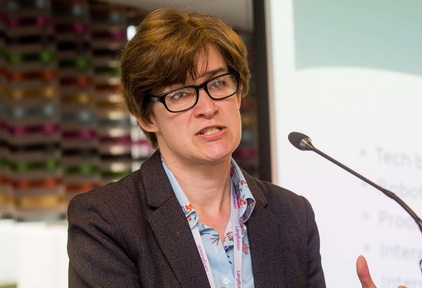Care home leader warns depriving residents of visits risks them 'giving up hope'
A national care home body and Age UK are warning the government that depriving residents of the “unprecedented pleasure” brought by visits from loved ones risks the “raw reality” of residents going “downhill fast, giving up hope and ultimately dying sooner”.

Vic Rayner, executive director of the National Care Forum which represents care homes and Caroline Abrahams, charity director at Age UK, have said in a jointly written blog that for many older people living in care homes, "their physical and mental health significantly declines as a result of a prolonged lack of connection with those who mean most to them."
'Not aware of any evidence' that carefully managed visits bring significant risk
In the blog they said: “We are not aware of any evidence showing that ‘visits’, if carefully managed, have been a significant risk in spreading the infection so far.
“On the contrary, our understanding is that the evidence points more towards people who come in and out of a care home inevitably being rather more of an ongoing risk, whether they are staff or visiting GPs and district nurses, or indeed CQC inspectors. Unless these incomers are housed on site they live in communities like the rest of us and so are as vulnerable to picking up the infection as we all are.”
The two organisations say the Social Care COVID-19 winter plan, launched by Department of Health and Social Care, “while not outright banning visiting, gets awfully close to it”.
The winter plan outlines measures which have created a blanket lockdown of care homes in so-called ‘areas of intervention’, “which on the last count amounted to a geography covering nearly 20 per cent of all care homes in England”.
Vic Rayner and Caroline Abrahams say the health and care sector should rally around and this includes the Care Quality Commission, local authorities, and health and care staff to do “everything we can to enable safe visiting in care homes”.
“Everyone has their part to play in making this a success: homes need to communicate transparently and often, sharing their thinking and measures to minimise risk as the situation changes; relatives need to ensure they are working with the home to facilitate these mitigations. A polarised debate helps no one".
The term 'visiting' they argue “fails to capture" what many relatives do for residents to supplement the care given by staff. "It is not unusual, for example, for the partner of a resident with dementia to spend many hours with them, helping them very slowly to eat and drink sufficiently.”
'Love makes all the difference'
Relatives and friends they say give residents a reason to stay cheerful and are often able to communicate with a person who has dementia "in a way which even the most highly skilled staff cannot manage – love makes all the difference.”
To ensure visiting can continue as “the default position” during the pandemic, they argue testing is “fundamental” to manage the virus but getting that right “sits in the lap of the Government. To stop visiting because testing capacity or capability is not sufficient is not good enough”.
The NCF and Age UK would like to see rapid saliva testing for all visitors, including for relatives, visiting health professionals and CQC inspectors.
The two organisations also highlighted as an issue the lack of “wellbeing metrics” for those living within care settings and called on care homes to “harness the power of those working with electronic care planning systems to develop these and roll them out”.
The NCF and Age UK also recommend:
• Designating one person per resident as a ‘special visitor’ who should be eligible for regular testing, PPE and training alongside the care home staff, to help facilitate their ability to keep coming in.
• Public liability indemnity for care home providers. They urge the government to address “the ever tightening insurance market”. While it has offered indemnity to the NHS, they say it needs to do the same for the care sector.
• Investing in the care home setting to minimise risks to visiting could secure space inside buildings to make visiting as safe as possible. so that every home has a space they can use to keep people safely connected.
The jointly written blog warns: "Social care is a holistic service – it is concerned with people’s mental and physical health alongside their spiritual and emotional wellbeing – we lose sense of the balance of all these elements at our peril".
Latest News
 29-Jul-24
Dementia Bus gives carehome.co.uk staff insight into life with dementia
29-Jul-24
Dementia Bus gives carehome.co.uk staff insight into life with dementia
 01-Mar-24
Find out the top care homes in 2024
01-Mar-24
Find out the top care homes in 2024
 21-Mar-23
UK's top care homes in 2023 revealed
21-Mar-23
UK's top care homes in 2023 revealed
 03-Jan-23
carehome.co.uk launches free care helpline
03-Jan-23
carehome.co.uk launches free care helpline
 13-Dec-22
5 mins with Emily Whitehurst, chief operating officer for Constantia Healthcare
13-Dec-22
5 mins with Emily Whitehurst, chief operating officer for Constantia Healthcare